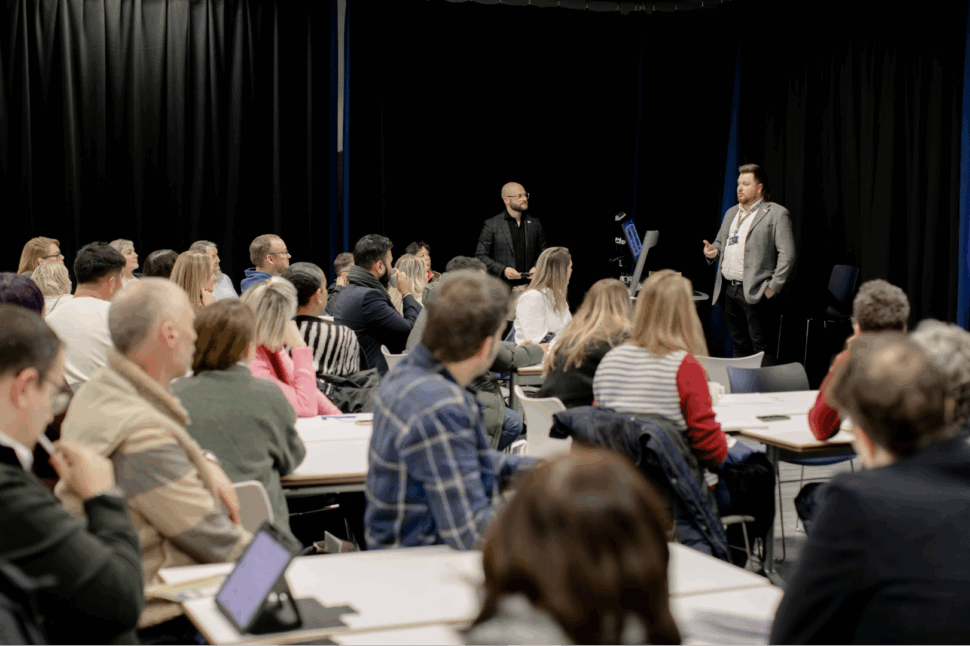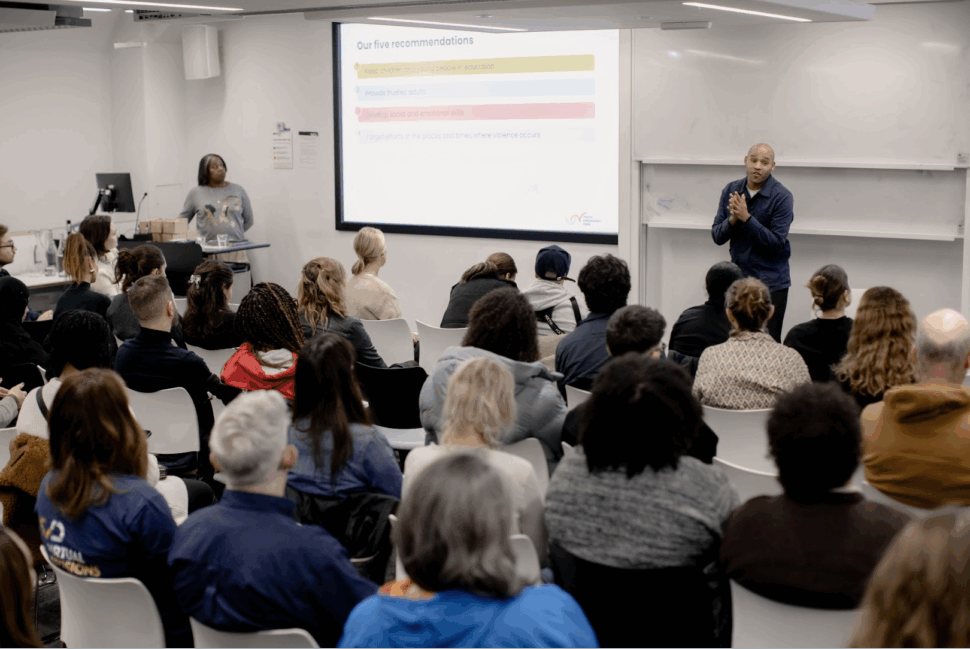That’s why this January, IncludEd is bringing together the biggest-ever conference dedicated solely to Whole-School Inclusion – packed with pragmatic, practical strategies from speakers who are on the ground and doing the doing.
This isn’t new to us. IncludEd 2026 is the culmination of years of work answering the question, “How do we make inclusive schools?” When it began in 2019, there were 80 people in a school sports hall. The microphones didn’t really work. Someone’s laptop insisted on a software update just as the keynote began. What we lacked in polish, we made up for in purpose. Those first conversations were raw, hopeful, and deeply practical.
Then came a pandemic pause, a 250-person return, then 500, then 750. Momentum grew – and now, in the dark of January, school leaders from all across England will turn up on a Saturday to answer some of the toughest questions in education at the education conference for inclusion.
The IncludEd community has run, and continues to run, ahead of policy change. Here are the four themes of the conference that offer crucial insights for those preparing for the new Ofsted framework.
Meeting a Range of Pupils’ Needs
Ofsted’s new framework asks schools not just to think about children with SEND and those eligible for pupil premium, but also those previously known to children’s social care — and all pupils “who may face other barriers to their learning or wellbeing,” including those “who share a protected characteristic.” That’s a lot! So how do school leaders get data on those young people, their needs, and what to do next?
This is a challenge The Difference charity — which runs IncludEd — has long been raising. We can’t know everyone who is vulnerable just from the data we already hold in our management information systems.
So how can schools know who needs more support? This year’s IncludEd line-up pulls together different answers:
- Professor Neil Humphrey shares the latest patterns in pupil wellbeing from BeeWell’s region-wide school surveys – identifying which individuals and groups have the lowest wellbeing, and what schools are doing about it.
- Pupil Pathways share how they’ve worked with virtual schools to piece together the picture on historic social care interaction – data often missing from schools’ databases.
- Dr Sally Burtonshaw shares her research on tackling online conspiracy thinking in schools, with school leaders reflecting on their behaviour systems to address threats to wellbeing such as misogyny.
- Lewis Hamilton’s charity, Mission44, shares their latest work with the Department for Education on supporting engagement and belonging for young people.
Measuring Inclusion
For a long time, pastoral professional development has lagged behind curriculum CPD. The hallmark of the best professional development is whether it leads to school improvement and improved outcomes for children. The Difference and its IncludEd conference have long argued that we need the same perspective on pupil belonging, attendance, and behaviour.
The conference is built around their answer to this; the Lost Learning Continuum, a mainstay of The Difference’s professional development work. Each year, alumni of their training share innovations that have led to better outcomes. Often these are experiences below the “headlines” of persistent absence or suspension. It might be a reduction in internal truancy (which Teacher Tapp reports 95% of secondary schools are concerned about, half of them even more so than attendance challenges) or reductions in the number of children needing to go to a removal room. This year promises similar sneak peeks at how leaders are measuring whether their professional development and policy changes are actually improving outcomes for pupils.

Inclusion is Built from the Universal Up
An example of where IncludEd has often run ahead of the policy discussion is in-school support units, Internal Alternative or Enhanced Provisions, informed by The Difference’s research into inclusive practice.
This in-school support is an example of the tiered offer of inclusion The Difference promotes. “Built up from the universal” is how they describe it: starting with the core offer – curriculum, routines, expectations – rather than building out from the children whose needs are most acute and missing those whose needs are worsening. The theory goes that, by starting this way, fewer children’s needs will escalate towards leaving mainstream school.
Targeted or specialist support must grow from a strong universal foundation — not patch its gaps.
UCL Institute of Education, Saturday 11 January 2025
These three takeaways will all be explored at IncludEd Conference. Alongside keynotes from household names like actor Anna Maxwell-Martin (Motherland, Line of Duty, and more), and Tom Rees on the national landscape, the event aims to help build inclusive schools that go far beyond Ofsted. We’ll hear from those on the ground persistently disrupting, challenging, and changing practice for the better – emerging leaders, headteachers, trust and LA leaders, researchers, and practitioners sharing the best of Whole-School Inclusion practice from across the country.
Come for the ideas, stay for the community. IncludEd Conference by The Difference takes place on Saturday 10 January 2026, at University College London’s (UCL) Institute of Education. Use promo code 10by10 to get tickets for just £50 for you and colleagues at your school.
For questions and queries email jamie@the-difference.com.

Confirmed speakers include:
- Inclusion beyond meeting special needs: Ofsted Inclusion Adviser Mark Vickers in discussion with MAT leader Jonny Uttley, DfE SEN Tsar Christine Lenehan, and ASCL General Secretary Pepe Di’Iasio.
- Contextual safeguarding in inclusive schools: Keynote from Professor Carlene Firmin (University of Durham).
- Online conspiracy thinking in schools — behaviour policy responses: Professor Sally Burtonshaw (Policy First) alongside school leaders from mainstream, special, and AP.
- Barriers to wellbeing — capturing belonging: Professor John Jerrim (UCL/ImpactED) & Professor Neil Humphrey (University of Manchester / #BeeWell).
- Improving attendance: DfE RISE Adviser on Inclusion Matt Jones alongside school leader Craig Patterson (Two Counties Trust).
- Setting up Internal Alternative Provision: Jamie Rogers, co-author of The Difference’s Internal Alternative Provision report, in a workshop with leaders on differing models of in-school support.
- Inclusive leadership in challenging contexts: MAT leader Dave Whitaker in conversation with senior leaders across mainstream and alternative provision on their biggest career challenges leading inclusive schools.
- Identifying children with historic social care interaction: Pupil Pathways, VRU leader Adela Kay, and school leader Rebekah Chew.
- Relational adults, trusted adults, support staff: Terry Grego, Football Beyond Borders.
- Reintegration from absence & suspension: Amelie Thompson, Gerry Robinson, Marius Frank.
- Measurement across MATs: MAT senior leaders on using data to change the inclusion picture across groups of schools.
- Inclusive strategy across a local area: Anthony Benedict (CEO, Ambition Community Trust).
- Inclusion for All: The organisations building a shared national definition of inclusion.















Your thoughts